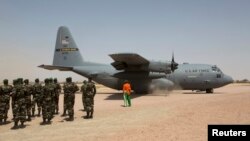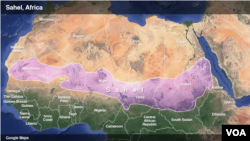A draft of a Pentagon report on the attack in Niger that killed four American soldiers, four Nigerien soldiers and an Nigerien interpreter last October calls for a smaller, more cautious U.S. military presence in West Africa, according to sources who spoke to The New York Times.
That could emphasize the need for deeper diplomatic and political engagement in the Sahel, given ongoing security challenges and difficulties in funding and coordinating a regional task force.
Militant groups
Details about who is responsible for the October 4 attack have been difficult to confirm. However, U.S. and Nigerien forces blamed Islamic State fighters shortly after the ambush in the Tillaberi region of Niger.
The Sahel region faces numerous security challenges, with jihadist militant groups expanding across lawless regions of Niger and Mali. Without state security forces to stop them, local militants have proliferated.
“There is almost no Malian administration on the other side of the border. I mean, right now it’s extremely problematic for the Malian forces to get out of the main cities in the north, so they are almost not in a position to go up to the border,” said Jean-Herve Jezequel, the West Africa deputy project director at the International Crisis Group, an organization working to prevent global conflict.
Jihadist militants may claim allegiance to IS or al-Qaida, but they often have weak connections to major terrorist organizations. These groups attract young men with few prospects, who pick up guns to survive, often with no ideological reasons to fight, Jezequel said.
Mediating dialogue
Jezequel sees two ways forward: increasing the military presence — an option that looks less likely given the Pentagon’s new report — or deepening political and diplomatic engagement.
“You have elements that are not hard-core jihadi fighters, who don’t want really to fight the state. What they’re looking for is a position in their own society, and sometimes they’re looking for [an] exit strategy,” Jezequel said.
That creates space for dialogue, Jezequel added, so long as there’s coordination with the military and at least a temporary halt on attacks.
The Pentagon’s recommendation comes after significant political fallout in the U.S. following the Niger attack, with some members of Congress raising sharp questions about why the American presence in the Sahel has grown to 1,300 personnel and whether enough oversight has been exerted.
The newly formed regional G5 Sahel joint task force, meanwhile, has been hamstrung by low funding and disagreements among member states about who’s contributing what, underscoring the need for an immediate solution to West Africa’s deteriorating security situation.
For Jezequel, that means expanding the Western presence by increasing financial assistance and mediating dialogue between different regional actors.
“In the past there have been a lot of misunderstandings between Mali and Mauritania, for instance, Niger and Mali sometimes, so there is a need … to restore some form of common understanding — of trust — between the states,” he said.










